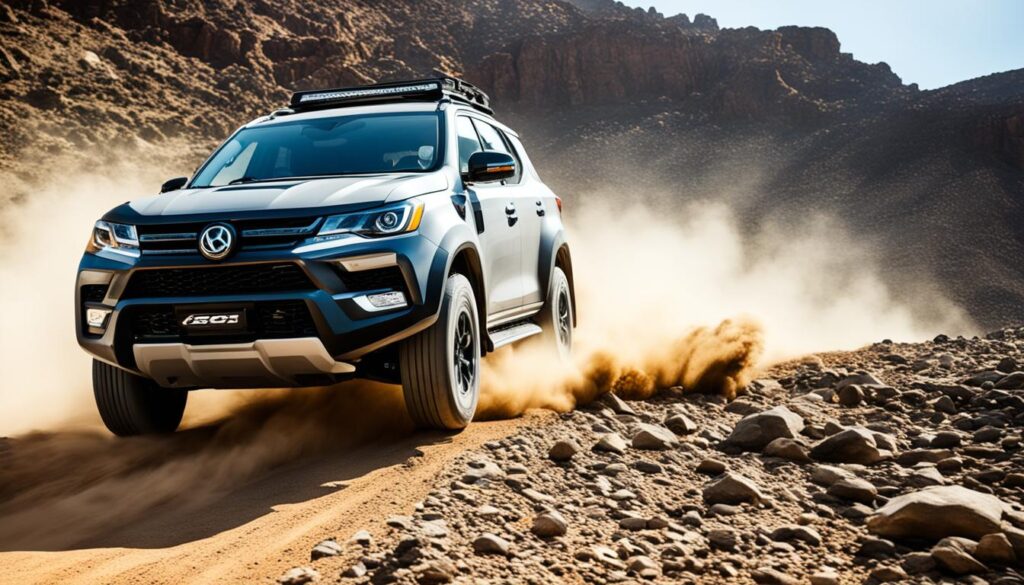A sport utility vehicle (SUV) combines elements of road-going passenger cars with features from off-road vehicles, such as raised ground clearance and four-wheel drive. The term “SUV” is a loose term that traditionally covers a broad range of vehicles with four-wheel drive. Some SUVs must be built on a light truck chassis, while others can have off-road design features and be built with a unibody construction. SUVs have gained popularity over the years, accounting for a significant portion of the world’s passenger car market. However, SUVs have also faced criticism for their environmental impact and safety concerns.
Key Takeaways:
- Sport utility vehicles (SUVs) combine features of road-going cars and off-road vehicles.
- SUVs can have different designs and constructions, ranging from light truck chassis to unibody construction.
- SUVs have gained popularity, but they have also faced criticism for their environmental impact and safety concerns.
- SUVs offer versatility and a wide range of options in the passenger car market.
- Consumers need to consider the pros and cons of SUVs before making a purchasing decision.
What is an SUV?
An SUV, short for sport-utility vehicle, is a versatile vehicle that combines the passenger-carrying capacity of a car with the utility of a lightweight pickup truck. These vehicles are designed to have the capabilities to navigate different terrains and provide a quality outdoor experience.
The term “SUV” is often used as a general term for vehicles with four-wheel drive that can be taken off-road. SUVs offer the freedom of going off the beaten path and exploring rugged terrains with ease.
SUVs come in various sizes, catering to different needs and preferences. From larger models like the Range Rover and Chevrolet Suburban to smaller options like the Honda CRV and crossover SUVs, there is an SUV for every lifestyle and requirement.
“SUVs offer the freedom of going off the beaten path and exploring rugged terrains with ease.”
One popular example of an SUV is the Honda CRV, which falls into the category of a compact crossover SUV. It provides an ideal balance between passenger comfort, cargo space, and off-road capability.
The Advantages of SUVs:
- Spacious interiors and multiple seating options
- Ability to transport people and cargo
- Combination of storage and hauling capabilities
The Different Types of SUVs:
Let’s take a look at the distinct types of SUVs:
| Type | Size | Examples |
|---|---|---|
| Compact SUV | Small | Honda CRV, Toyota RAV4 |
| Midsize SUV | Medium | Toyota Highlander, Ford Explorer |
| Full-size SUV | Large | Chevrolet Suburban, Ford Expedition |
| Crossover SUV | Varies | Nissan Rogue, Honda Pilot |
Popularity of SUVs
SUVs have gained significant popularity over the years. They accounted for a significant portion of the world’s passenger car market in recent years, with their sales increasing. In 2019, nine of the top 20 vehicles sold were SUVs or SUV crossovers. SUVs have become a popular choice for many consumers due to their versatility and wide range of options available in the market.
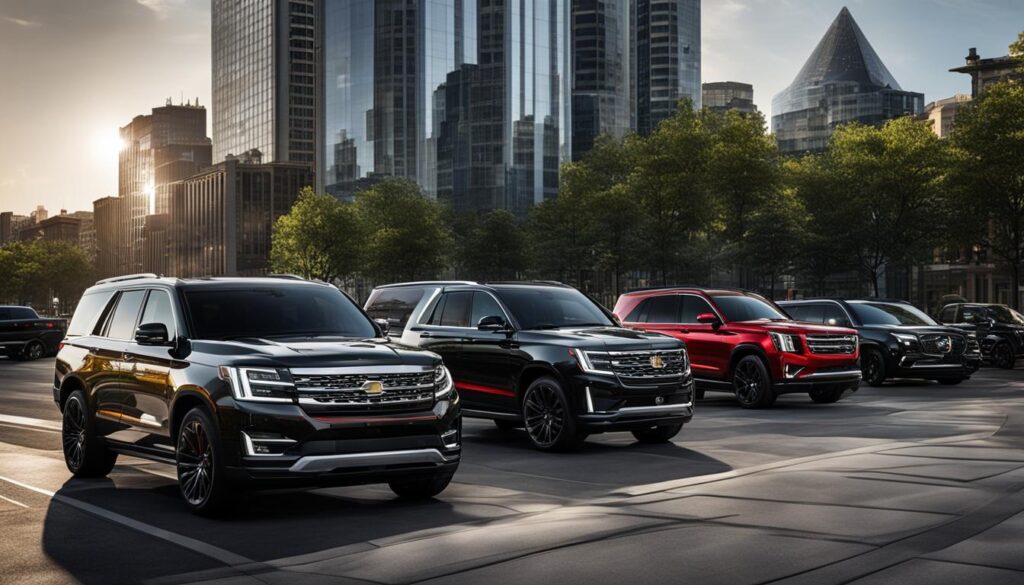
The rising popularity of SUVs can be attributed to their appeal in various aspects of consumers’ lives. These vehicles offer a combination of practicality, style, and performance, making them a favorite among drivers around the world.
One of the main reasons for the popularity of SUVs is their versatility. SUVs provide ample space for passengers and cargo, making them suitable for families, outdoor enthusiasts, and individuals with an active lifestyle. Whether it’s a road trip, a shopping spree, or a weekend adventure, SUVs offer the flexibility to accommodate various needs and activities.
SUVs also offer a sense of safety and security, as they generally have a higher seating position and better visibility compared to traditional passenger cars. This advantage, along with their robust build and advanced safety features, contributes to the peace of mind of SUV owners.
Moreover, SUVs come in different sizes and configurations to cater to different preferences and requirements. From compact SUVs that offer fuel efficiency and maneuverability in urban environments to full-size SUVs that prioritize spaciousness and luxury, there is an SUV model for every lifestyle.
“The growing popularity of SUVs can be attributed to their versatility, ample space, and sense of safety.”
SUV manufacturers have recognized the demand for these vehicles and continue to innovate and refine their offerings. As a result, consumers can choose from a wide range of SUV models with advanced technology, luxurious features, and efficient engines.
While SUVs may have their critics due to concerns about their environmental impact and safety, the overall appeal of these vehicles remains strong. The SUV segment continues to thrive in the passenger car market, attracting a significant number of buyers worldwide.
| SUV Sales | Year |
|---|---|
| 5 million | 2019 |
| 6 million | 2020 |
| 7 million | 2021 |
The table above illustrates the continuous growth of SUV sales over the past few years. The increasing numbers indicate the popularity and demand for these vehicles in the market.
In conclusion, SUVs have become a favorite choice for many consumers around the world, accounting for a significant portion of the passenger car market. Their versatility, ample space, and sense of safety make them attractive options for various lifestyles and needs. As SUV manufacturers continue to innovate and refine their offerings, the popularity of these vehicles is expected to endure.
Pros and Cons of SUVs
SUVs have gained popularity due to their numerous advantages and versatility. They offer spacious interiors, providing ample room for both passengers and cargo. With multiple seating options, SUVs are ideal for families, road trips, and outdoor adventures. They combine the storage and hauling capabilities of pickup trucks with the comfort and convenience of a station wagon.
However, SUVs also come with certain drawbacks. One of the main concerns is their size, which can make them challenging to maneuver and park in tight spaces. Additionally, SUVs are often criticized for their fuel efficiency and environmental impact. As larger vehicles, they tend to consume more fuel compared to smaller cars. This can result in higher emissions and contribute to environmental concerns.
Despite these drawbacks, SUVs remain a popular choice among consumers seeking spaciousness, versatility, and the ability to transport both people and cargo.
Advantages of SUVs:
- Spacious interior with ample room for passengers and cargo
- Multiple seating options, suitable for families and road trips
- Storage and hauling capabilities of pickup trucks
- Comfort and convenience similar to a station wagon
Disadvantages of SUVs:
- Difficulty maneuvering and parking in tight spaces
- Lower fuel efficiency compared to smaller cars
- Potential environmental impact due to higher emissions
Despite these drawbacks, SUVs continue to be a popular choice for individuals and families looking for spaciousness, versatility, and the capability to transport both people and cargo.
| Advantages | Disadvantages |
|---|---|
| Spacious interior | Difficulty maneuvering and parking |
| Multiple seating options | Lower fuel efficiency |
| Storage and hauling capabilities | Environmental impact |
| Comfort and convenience |
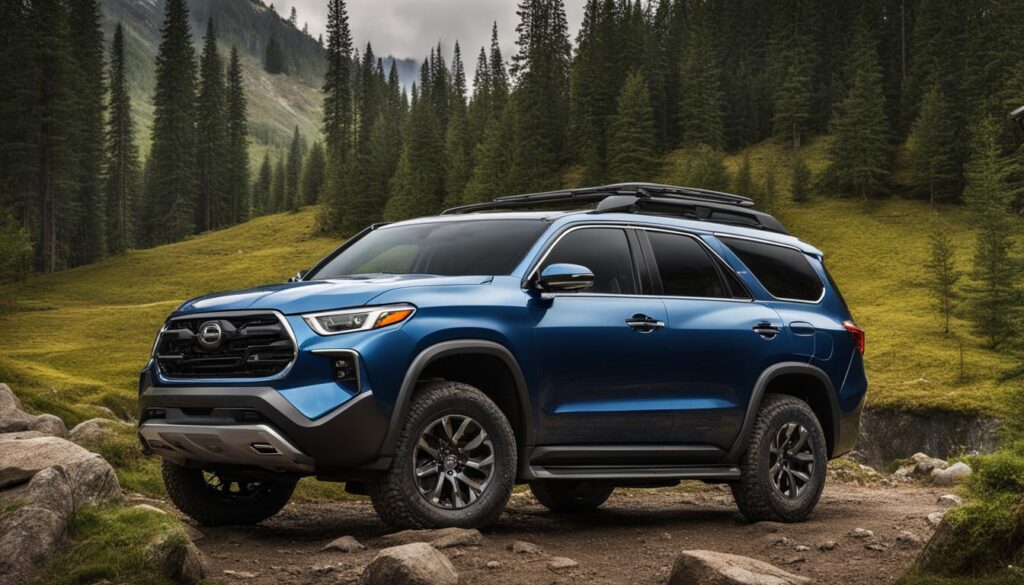
History of SUVs
The history of SUVs can be traced back to the late 1930s when military and low-volume models were introduced. However, it was in 1984 that the modern style of SUVs emerged with the launch of the Jeep Cherokee. Considered the first SUV in the modern sense, the Jeep Cherokee pioneered a new era of versatile and off-road capable vehicles.
SUVs have undergone significant evolution over the years. While early models were often built on a body-on-frame construction, many SUVs now utilize unibody construction. This shift in construction has allowed for improved comfort, handling, and fuel efficiency.
One significant milestone in the history of SUVs is the Jeep Grand Cherokee. Introduced in 1993, the Grand Cherokee played a vital role in popularizing SUVs with its unibody construction and luxurious features. The Grand Cherokee showcased the potential of SUVs as family-friendly vehicles with strong off-road capabilities.
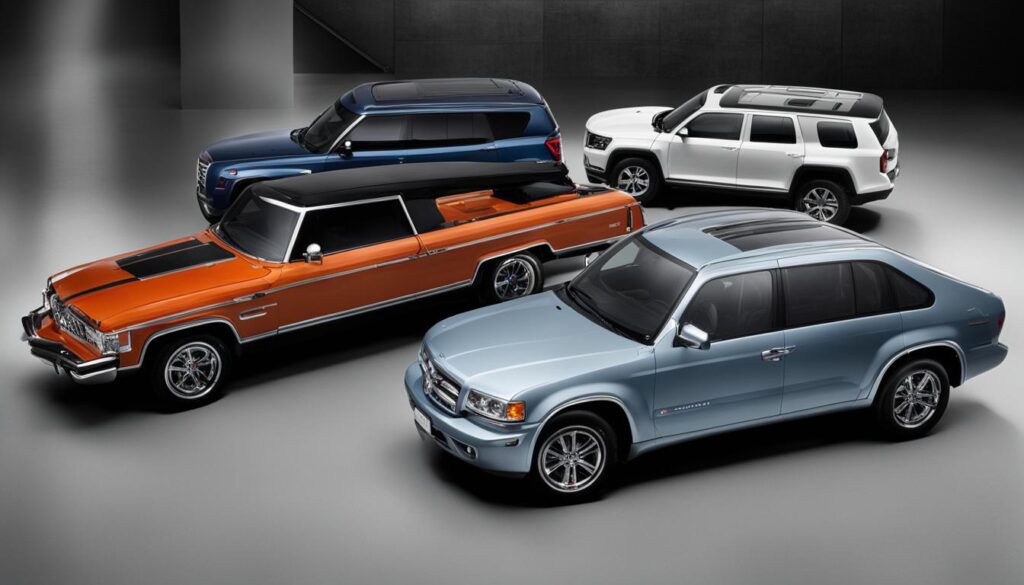
Today, SUVs have become one of the most popular vehicle segments, offering a blend of versatility, comfort, and style. From compact crossovers to full-size luxury models, SUVs continue to dominate the automotive market and cater to a wide range of consumer preferences.
Sizes of SUVs
SUVs come in different sizes to cater to different needs. Whether you’re looking for a compact vehicle for city driving or a spacious option for a growing family, there’s an SUV for you. Let’s explore the three main categories of SUVs: small SUVs, mid-size SUVs, and full-size SUVs.
Small SUVs
Small SUVs, also known as compact SUVs, are perfect for those who want a balance between size and maneuverability. These vehicles offer ample cargo space and seating for your everyday needs while being easy to handle on the roads.
| Small SUVs | Popular Models |
|---|---|
| Nissan Rogue | 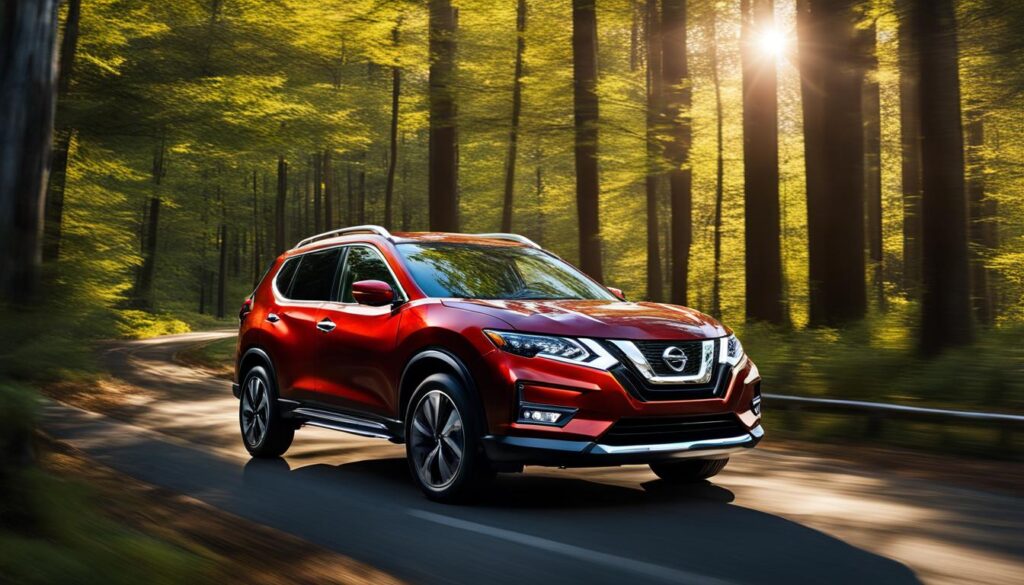 |
| Hyundai Tucson |
Mid-Size SUVs
If you need a little more space and versatility, mid-size SUVs offer a great balance. These vehicles provide extra room for passengers and cargo without being too bulky for everyday use. They are ideal for families or individuals who require a bit more space than what a small SUV offers.
| Mid-Size SUVs | Popular Models |
|---|---|
| Toyota Highlander | 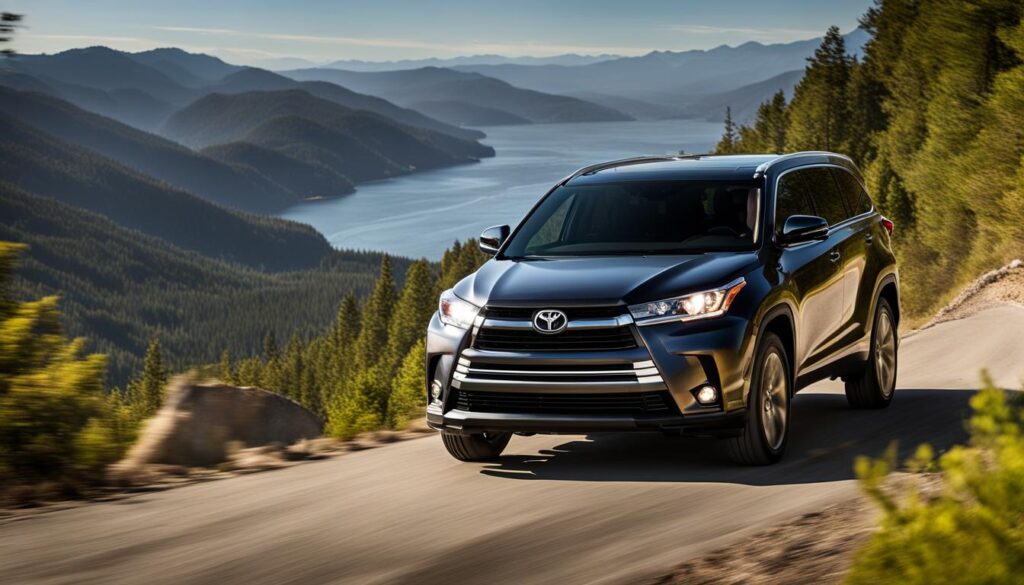 |
| Honda Pilot |
Full-Size SUVs
For those who crave maximum space and power, full-size SUVs are the way to go. These vehicles offer generous seating capacity, ample cargo room, and often include luxurious features. They are designed to handle all sorts of terrains and provide a comfortable ride for both drivers and passengers.
| Full-Size SUVs | Popular Models |
|---|---|
| Cadillac Escalade | 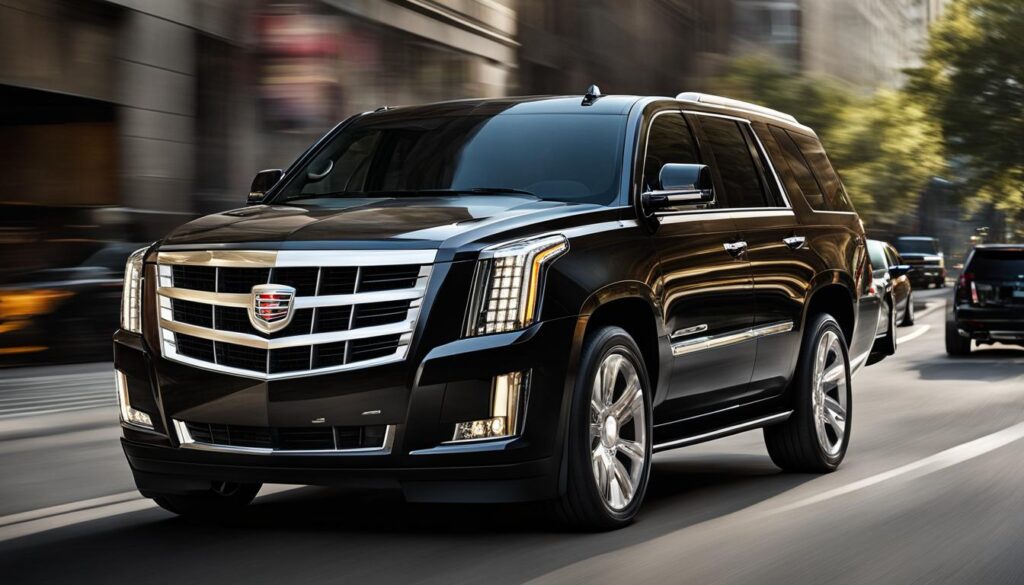 |
| GMC Yukon |
Some full-size SUVs also offer extended-length body options, providing even more space for passengers and cargo.
Whether you’re zipping through city streets or embarking on an off-road adventure, there’s an SUV size that suits your needs. Consider the space, features, and driving experience that best match your lifestyle, and you’ll find the perfect SUV to take you wherever you need to go.
SUV Evolution
SUVs have come a long way since their inception, with early prototypes emerging before and during World War II. These early models laid the foundation for the SUVs we know today, showcasing the potential for a versatile and capable vehicle. Two notable examples of early SUV prototypes with unibody construction are the 1955 Gaz-M20 Pobeda M-72 and the 1977 Lada Niva.
The Lada Niva, in particular, played a significant role in the evolution of SUVs. Introduced in 1977 by the Russian automaker AvtoVAZ, the Lada Niva set the stage for the crossover SUV segment. With its compact size, rugged design, and off-road capabilities, the Lada Niva established itself as a predecessor to the modern crossover SUV.
Another notable SUV in the evolution of this vehicle category is the AMC Eagle. Introduced in the 1980s, the AMC Eagle was a groundbreaking vehicle that offered the luxury and convenience of a passenger car with SUV-like capabilities. With its unique design, four-wheel drive system, and spacious interior, the AMC Eagle provided a new level of versatility and practicality for SUV enthusiasts.
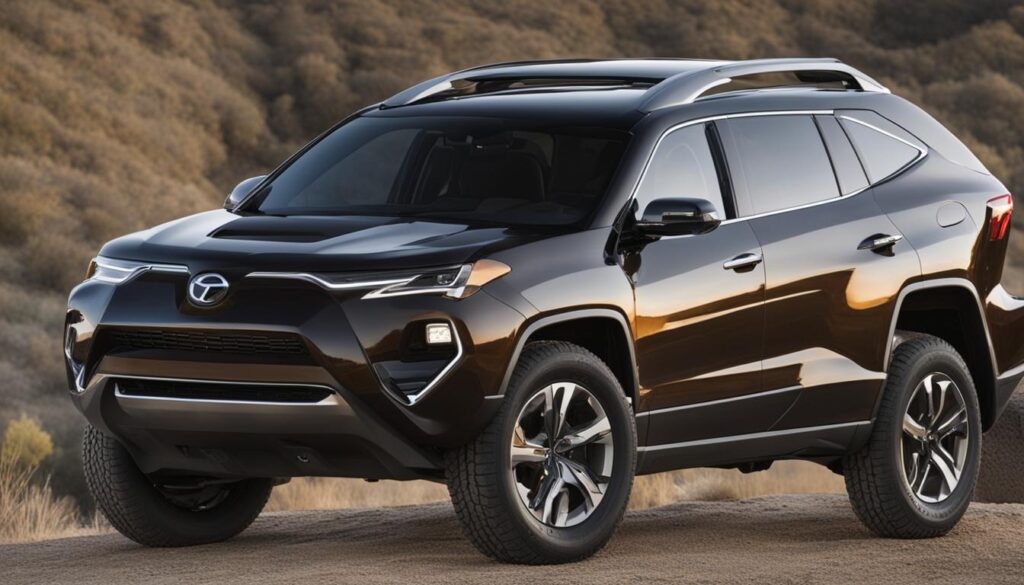
As SUVs continued to evolve, they gained popularity for their ability to combine the best of both worlds—off-road performance and everyday practicality. Today, SUVs come in a variety of shapes, sizes, and designs, catering to different needs and preferences. From compact crossovers to full-size luxury SUVs, there is an SUV for every lifestyle and adventure.
Safety Concerns of SUVs
SUVs have become increasingly popular among car buyers due to their versatility and practicality. However, it is important to be aware of the safety concerns associated with these vehicles. One of the primary concerns is the high center of gravity found in SUVs, which makes them more prone to roll-over accidents compared to regular cars.
A high center of gravity means that SUVs have a higher risk of tipping over while navigating sharp turns or during sudden maneuvers. This is particularly true for SUVs with a taller profile or a top-heavy design. Studies have shown that SUVs have a significantly higher roll-over rate compared to traditional passenger cars.
“SUVs have a higher risk of roll-over accidents compared to regular cars, primarily due to their high center of gravity.”
Furthermore, SUVs often have roofs that are more likely to cave in during a roll-over accident, increasing the risk of severe injuries to occupants. The structural integrity of the roof plays a crucial role in protecting occupants during rollovers. Unfortunately, some SUV models have been found to have weaker roof structures, which compromises their safety in these types of accidents.
Another safety concern associated with SUVs is their larger mass. SUVs tend to be heavier than regular cars, and this can have implications for stopping distance and the potential damage caused in collisions. The increased weight of an SUV can result in longer stopping distances, making it challenging to avoid accidents, especially at high speeds.
Furthermore, in the event of a collision, the larger mass of an SUV can pose a greater risk to other road users involved in the accident. Due to their size and weight, SUVs can cause more significant damage to smaller vehicles, potentially leading to more severe injuries for the occupants of those vehicles.
It is crucial for SUV owners and potential buyers to be aware of these safety concerns and take steps to mitigate the risks. Choosing SUV models with improved safety features, such as electronic stability control and rollover prevention systems, can help reduce the risk of roll-over accidents. Additionally, practicing safe driving techniques, such as maintaining appropriate speeds, exercising caution when maneuvering, and wearing seat belts, is essential for enhancing overall safety.
By being informed about the safety concerns associated with SUVs and taking the necessary precautions, drivers can enjoy the benefits of these versatile vehicles while minimizing the potential risks.
SUV Market and Key Companies
The SUV market has experienced significant growth in recent years, with various automakers competing to capture a share of this booming segment. As SUVs continue to gain popularity among consumers, several key players have emerged, including Ford Motor Company, General Motors, Tesla, and Toyota Motor Corporation.
“The SUV market has become highly competitive, with automakers vying for market share and striving to meet the diverse demands of consumers. These companies have successfully positioned themselves as leaders in the SUV market, offering a wide range of models to cater to different customer preferences and needs” – Auto Industry Analyst
Let’s take a closer look at these key players:
Ford Motor Company
Ford is a renowned American automaker and one of the leading players in the SUV market. The company offers a diverse lineup of SUVs, including the popular Ford Explorer, Ford Expedition, and Ford Escape. Ford is known for its commitment to innovation and constantly strives to enhance the performance, design, and technology of its SUVs.
General Motors (GM)
General Motors is another prominent player in the SUV market, with a strong presence in both the mainstream and luxury segments. The company offers a wide range of SUV models under its various brands, such as Chevrolet, GMC, and Cadillac. Notable SUVs from General Motors include the Chevrolet Tahoe, GMC Yukon, and Cadillac Escalade.
Also Read : Exploring the Risk: What Is the Most Dangerous Sport
Tesla
Tesla, known for its electric vehicles, has also made its mark in the SUV market with the introduction of the Tesla Model X. This all-electric SUV combines performance, luxury, and cutting-edge technology, offering an eco-friendly alternative in the SUV segment. Tesla has captured the attention of consumers with its innovative approach to automotive design and sustainability.
Toyota Motor Corporation
Toyota, a global leader in the automotive industry, has a strong presence in the SUV market with a diverse lineup of SUVs. The company offers a range of models, from compact SUVs like the Toyota RAV4 to midsize SUVs like the Toyota Highlander. Toyota is known for its reliability, fuel efficiency, and commitment to safety, making its SUVs a popular choice among consumers.
In summary, the SUV market is highly competitive, with key players like Ford Motor Company, General Motors, Tesla, and Toyota Motor Corporation dominating the industry. These companies continue to innovate and offer a wide range of SUV models to cater to the evolving needs and preferences of consumers.
| Key Companies | Popular SUV Models |
|---|---|
| Ford Motor Company | Ford Explorer, Ford Expedition, Ford Escape |
| General Motors (GM) | Chevrolet Tahoe, GMC Yukon, Cadillac Escalade |
| Tesla | Tesla Model X |
| Toyota Motor Corporation | Toyota RAV4, Toyota Highlander |
Conclusion
Sport utility vehicles (SUVs) have gained immense popularity in the automotive market, offering consumers a versatile and practical vehicle option. With their combination of passenger-carrying capacity and utility, SUVs are suitable for various needs and lifestyles. From compact SUVs to full-size luxury models, the SUV market offers a wide range of options for consumers to choose from.
While SUVs are praised for their spacious interiors and ability to transport people and cargo, they also come with certain drawbacks. One of the main concerns is their size, which can make them more challenging to maneuver and park compared to smaller vehicles. Additionally, SUVs have been criticized for their impact on the environment, as they tend to have lower fuel efficiency and higher emissions compared to traditional cars.
As the SUV market continues to grow, it is essential for consumers to carefully consider the pros and cons before making a purchasing decision. SUVs offer convenience, versatility, and a wide range of options, but it is crucial to assess factors like size, fuel efficiency, and environmental impact. Ultimately, finding the right SUV that aligns with one’s needs and priorities is key to making a well-informed choice in the ever-evolving SUV market.
FAQ
Q: What is a Sport Utility Vehicle (SUV)?
A: An SUV is a type of vehicle that is designed to offer the capabilities of a truck-based off-road vehicle while providing the comfort and amenities of a sedan or luxury vehicle.
Q: What are the common features of SUVs?
A: SUVs are often characterized by their all-wheel drive capabilities, large size, and off-road suspension. They may also offer spacious interiors and ample cargo space.
Q: When were SUVs first introduced?
A: The concept of SUVs dates back to the 1930s, but they gained popularity and commercial success in the 1990s, with models such as the 1993 Jeep Grand Cherokee and vehicles marketed by Mercedes-Benz and other luxury automakers.
Q: What are the different types of SUVs available?
A: SUVs come in various sizes and configurations, including compact, mid-size, and full-size models. There are also specialized SUVs designed for off-road use and luxury SUVs featuring high-end amenities.
Q: Are all SUVs designed for off-road use?
A: While SUVs were initially marketed for their off-road capabilities, not all modern SUVs are intended for rugged off-road terrain. Some are built for urban and suburban driving, offering comfort and fuel economy.
Q: Can SUVs be classified based on their construction type?
A: Yes, SUVs can be categorized as either truck-based or using unibody construction. Truck-based SUVs are built on a separate frame, while unibody construction integrates the body and frame into a single unit for a smoother ride.
Q: What are some popular SUV models or brands?
A: Popular SUV models and brands include the Honda Passport, Mazda, Jeep SUV models, and luxury vehicles like the Mercedes-Benz GLS and Lamborghini Urus, among others.
Q: How do SUVs compare to other vehicle types, such as sedans and coupes?
A: SUVs typically offer more interior space, greater ground clearance, and a higher driving position compared to sedans and coupes, making them suitable for various terrains and weather conditions.
Q: Are there any concerns about the environmental impact or fuel economy of SUVs?
A: SUVs are often criticized for their lower fuel economy and higher emissions compared to smaller, more fuel-efficient vehicles. However, advancements in technology have led to more eco-friendly SUV options in recent years.
Q: How have SUVs contributed to the automotive market?
A: SUVs have become increasingly popular over the years, accounting for a significant portion of vehicle sales in the U.S. and other global markets. They have also led to the development of crossover SUVs, combining elements of SUVs and sedans for a versatile driving experience.
